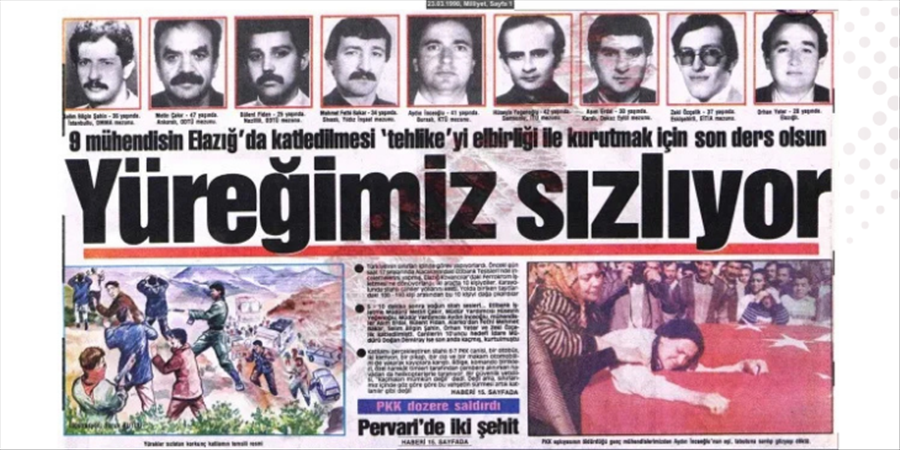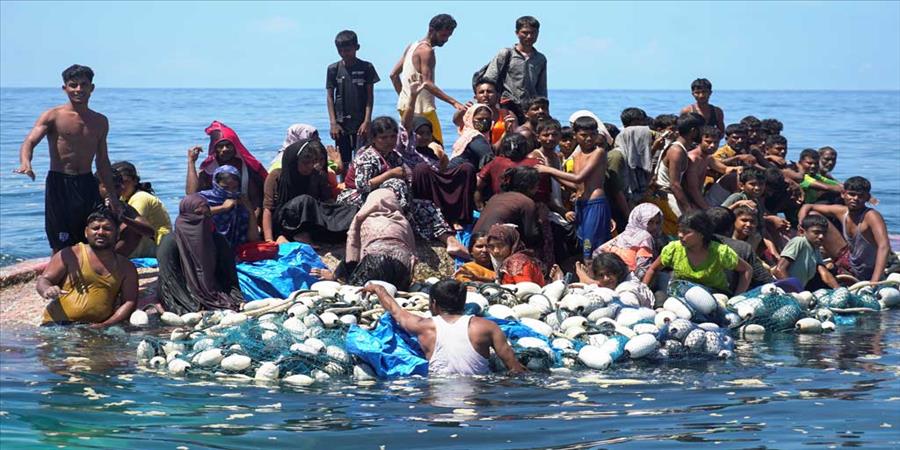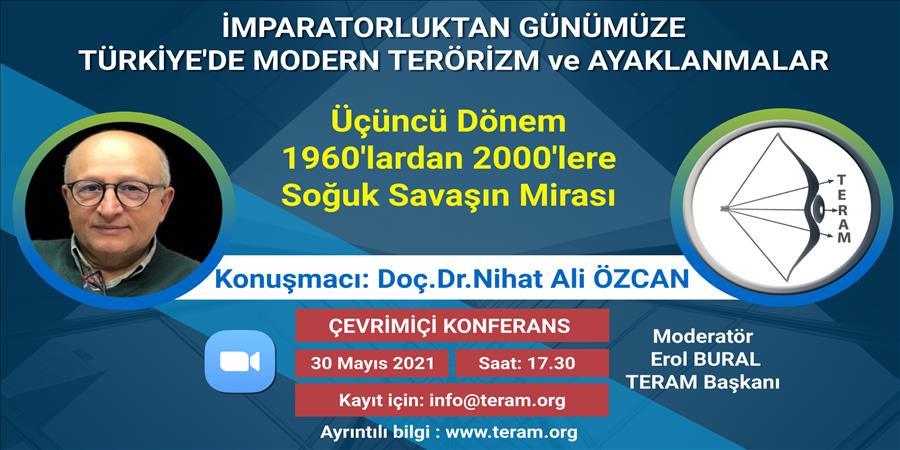
2020 Yılı Ocak Ayında Radikalleşme Alanında Yayımlanan Makaleler
- Agastia, I. G. B. D., Perwita, A. A. B., & Subedi, D. B. (2020). Countering violent extremism through state-society partnerships: a case study of de-radicalisation programmes in Indonesia. Journal of Policing, Intelligence and Counter Terrorism, 1–21. doi:10.1080/18335330.2020.1722317
- Al-Khoury, D. (2020). Radicalisation: old and new a comparative analysis of the Red Brigades and the Islamic State. Quality & Quantity, 1-19. doi:10.1007/s11135-020-00963-1
- Eleftheriadou, M. (2020). Fight after flight? An exploration of the radicalization potential among refugees in greece. Small Wars & Insurgencies, 31(1), 34-60. doi: 10.1080/09592318.2020.1672960
- Figoureux, M., & Van Gorp, B. (2020). The framing of radicalisation in the Belgian societal debate: a contagious threat or youthful naivety?. Critical Studies on Terrorism, 13(2), 1-21. doi:10.1080/17539153.2020.1714415
- Pelletier, P., & Drozda-Senkowska, E. (2020). Virtual reality as a tool for deradicalizing the terrorist mind: Conceptual and methodological insights from intergroup conflict resolution and perspective-taking research. Peace and Conflict: Journal of Peace Psychology. https://doi.org/10.1037/pac0000442
2020 Yılı Ocak Ayında Terörizm Alanında Yayımlanan Makaleler
- F. Burget, P. Dousa, (2020), Recommendations for Crisis Management in Mass Casualty Incidents, with a Focus on a Terrorist Attack. Acta Chirurgiae Orthopaedicae et Traumatologiae Cechoslovaca, Sayı 87, ss.62-67
- Tuba Gün Çığnı, Nadir Suğur, (2020), Terror Risk Perception and Fear of Terror in Turkey: Predictors, Bases and Consequences. Terrorism and Political Violence, doi: 10.1080/09546553.2020.1711741
- Muhammed Riaz Shad, Sajid Iqal, (2020), The Criminal Justice and War Model in Understanding Counterterrorism in Pakistan. Journal of Research in Social Sciences; Islamabad, Sayı 8, No. 1, ss. 141- 154
- Kavus Abushov, (2020), Drawing a Boundary between Structural Factors and Identity in Ethnic Conflict: Bringing Back the Role of Identity. Terrorism and Political Violence, doi: 10.1080/09546553.2020.1717475
- Thomas J. Holt, Joshua D. Freilich, Steven M. Chermak, (2020), Examining the Online Expression of Ideology among Far-Right Extremist Forum Users. Terrorism and Political Violence, doi: 10.1080/09546553.2019.1701446
- Michael J. Boyle, (2020), Weapon of Choice: Terrorist Bombings in Armed Conflict. Studies in Conflict and Terrorism, doi: 10.1080/1057610X.2019.1700039
- Laura Wakeford, Laura Smith, (2020), Islamic State’s propaganda and social media: dissemination, support, and resilience. ISIS propaganda, ss. 155-187
- Mattia Bevilacqua, David Morelli, Paola Sultana Renee Uzan, (2020), Asymmetric implied market volatility and terrorist attacks. International Review of Financial Analysis, Sayı 67, doi.org/10.1016/j.irfa.2019.101417
- Ayisha Khurshid, Ahdi Hassan (2020), Semantic complications in the war on terror discourse and manipulation of language by state and non-state actors. International Research Journal of Management, IT and Social Sciences, Sayı 7(1), ss. 162-168, doi: 10.21744/irjmis.v7n1.838
- Altay, A., Baykal-Gürsoy, M., & Hemmer, P. (2020). Behavior Associations in Lone-Actor Terrorists. arXiv preprint arXiv:2001.09945.
- Ibrahim Musa, Audu, Ibrahim Maigari, (2020), Terrorısm And Insurgency In Nıgerıa: An Assessment Of Adamawa State Experıences. International Journal of All Research Writings, Sayı 1, (7)
- Mohd Ashraf Ganaie (2020), Global terrorism and its impact on business. Research Review Journals, Sayı 5, (1)
- Debendra Mahalik, (2020), Terrorism in Central Asia: Security Implications for Russia. Journal of International Studies, Sayı 8 (1), ss. 133-147, ISSN 2289-666X
- Georgios Pavlidis, (2020), Financial action task force and the fight against money laundering and the financing of terrorism: Quo vadimus?. Journal of Financial Crime, doi: 10.1108/JFC-09-2019-0124
- Daniel J. Boches, (2020), Social Geometry and the ‘Terrorism’ Label, Dilemas, Rev. Estud. Conflito Controle Soc., Sayı 1, (1), ss. 147-168
- Rita Augestad Knudsen, (2020), Between vulnerability and risk? Mental health in UK counter-terrorism. Behavioral Sciences of Terrorism and Political Aggression, doi: 10.1080/19434472.2019.1703782
- Bertrand Ramcharan, Robin Ramcharan, (2020), Climate Change, Weapons of Mass Destruction, Terrorism. Conflict Prevention in the UN´s Agenda 2030, ss. 37-54
- H. Bahadır Türk, (2020), Hegemonic masculinity and terrorism: the case of the PKK and Abdullah Öcalan. Critical Studies on Terrorism, Sayı 13, (2), doi: 10.1080/17539153.2019.1708039
- Brittnee Carter, (2020), Bringing suspected terrorists to justice? Revealing bias against Muslims in applied counter terrorism by the U.S. Issues in Criminal, Social, and Restorative Justice, doi: 10.1080/10282580.2020.1719363
- John Harrington, (2020), #weareone: blood donation, terrorism and dreams of inclusion in Kenya. Cambridge University Press, Sayı 90, Özel Basım 1 (Beyond realism: Africa's medical dreams), ss. 112-131, doi: 10.1017/S0001972019000962
- Ikhwanuddin Ikhwanuddin, Irwansyah Irwansyah, Saut Panggabean Sinaga, Pahala ua Nababan, Edy Santoso, (2020), The Effectıveness Of Counterterrorısm In The Red Zone Of Terrorısm In Indonesıa (Case Study In Bıma, West Nusa Tenggara). International Review of Humanities Studies, Sayı 5, (1), doi: 10.7454/irhs.v0i0.226
- Inaki Sagardoy-Leuza, (2020), The Altsasu case: terrorism without terrorists. Critical Studies on Terrorism, Sayı 13, (2), ss. 296-311, doi: 10.1080/17539153.2020.1714416
- Daniel Goodrich, Frances Edwards (2020), Transportation, Terrorism and Crime: Deterrence, Disruption and Resilience. Mineta Transportation Institute Publications, doi:https://doi.org/10.31979/mti.2019.1896
- Aaron M. Hoffman, Dwaine HA Jengelley, (2020), Does bottom-line pressure make terrorism coverage more negative? Evidence from a twenty-newspaper panel study. Media, War & Conflict, doi: 10.1177/1750635219896001
- Florian Hartleb, (2020), Offenders and Terrorism. Ideology, Motives, Objectives. Lone Wolves, ss. 63-122
- Macpherson Uchenna Nnam, Cyril O. Ugwuoke, Vivian Chizoma Njemanze, Francis Azalahu Akwara, (2020), Boko Haram Terrorism and Human Security in Nigeria: Matters Arising. Journal of Aggression, Maltreatment & Trauma, doi: 10.1080/10926771.2019.1710637
- Muhammad Anwar, Muhammad Wasim Akbar, (2020), Framing terrorism by media: the inevitable coactions. Dilemas Contemporáneos: Educación, Política y Valores, Sayı 7, (2), ss. 1-14
- Fbian Maximilian Johannes Teichmann, (2020), Money-laundering and terrorism-financing compliance – unsolved issues. Journal of Money Laundering Control, Sayı 23 (1), ss. 90-95. https://doi.org/10.1108/JMLC-02-2018-0014
- Prıthvı Iyer, (2020), The Myth of ‘Pure Evil’: Using Behavioural Science to Help Understand and Counter Terrorism. ORF Issue Brief, No. 333
- Pierre Philippe Balestrini, (2020), Public opinion and terrorism: does the national economic, societal and political context Really Matter?. European Security, Sayı 29, (2), doi: 10.1080/09662839.2019.1708330
- Maria Grazia Galantino, (2020), The migration–terrorism nexus: An analysis of German and Italian press coverage of the ‘refugee crisis’. European Journal of Criminology, doi: 10.1177%2F1477370819896213
- Jacob Høigilt, Kjetil Selvik, (2020), Debating terrorism in a political transition: Journalism and democracy in Tunisia. International Communicatian Gazette, doi: 10.1177%2F1748048519897519
- Cameron Banjak-Corle, Lacey N. Wallance, (2020), Disaster experiences and terrorism news exposure: effects on perceptions of police and trust in local government in the United States. An International Journal, doi: 10.1080/15614263.2020.1716356
- Luis Moreno, (2020), The Historical Roots of Political Violence. Revolutionary Terrorism in Affluent Countries. Nationalism and Ethnic Politics
- Florian Hartleb, (2020), Right-Wing Terrorism. Still an Underestimated Threat. Lone Wolves, ss. 1-27
- Claudia Seabra, Pedro Reis, Jose Luis Abrantes, (2020), The influence of terrorism in tourism arrivals: A longitudinal approach in a Mediterranean country. Annals of Tourism Research, Sayı 80, doi: 10.1016/j.annals.2019.102811
- in Innes, (2020), Techniques of disinformation: Constructing and communicating “soft facts” after terrorism. The British Journal of Sociology, Sayı 71, (2), doi: 10.1111/1468-4446.12735
- Hong, F., Lin, Y., Jang, M., Tarullo, A., Ashy, M. and Malley-Morrison, K. (2020), Fear of terrorism and its correlates in young men and women from the United States and South Korea. Journal of Aggression, Conflict and Peace Research, Sayı 12 (1), ss. 21-32. doi: 10.1108/JACPR-12-2019-0462
- Vanda Vereb, Helena Nobre, Minoo Farhangmehr, (2020), Cosmopolitan tourists: the resilient segment in the face of terrorism. Tourism Management Perspectives, Sayı 33, doi: 10.1016/j.tmp.2019.100620
- Nizar Ahmad, Syed Rashid Ali, Arshad Khan Bangash, (2020), The Role Of Antı-Talıban Lashkar (Armed Mılıtıa) In Preventıon Of Terrorısm In Conflıct Affected Areas. Pakistan Journal of Society, Education and Language (PJSEL), Sayı 6, (1)
- Sermet Sezigen, Rusen Koray Eyison, Mesut Ortatatlı, Ertuğrul Kılıç, Levent Kenar, (2020), Myelosuppression and acute hematological complications of sulfur mustard exposure in victims of chemical terrorism. Toxicology Letters, Sayı 318, ss. 92-98, doi: 10.1016/j.toxlet.2019.10.017
İlginizi Çekebilir
Son İçerikler
PKK Terör Örgütü ve Özelleştirme Politikaları İlişkisi

Migrant Smuggling and Terrorism Connection on Migration Routes

Güvenlik ve İstihbaratın Geleceği ile İlgili Senaryolar

Videolar
Video-Üçüncü Dalga Terörizmin Öteki Yüzü: PKK Terör Örgütü
Tüm Videolar İçin Tıklayınız



.jpg)
